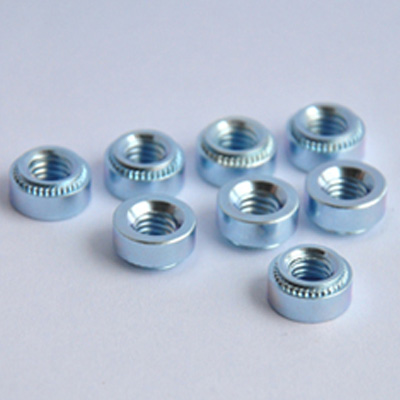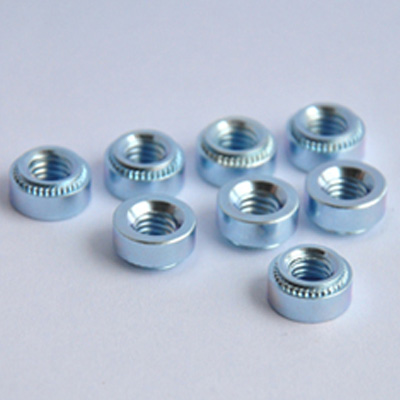
Self-locking clinch nuts are a type of fastener designed to provide secure, vibration-resistant connections in thin sheet metal, plastic, and composite materials. These nuts are ideal for applications where a strong, reliable thread connection is required, yet where there is limited access to the backside of the workpiece. Commonly used in automotive, aerospace, electronics, and manufacturing industries, self-locking clinch nuts are designed to enhance the integrity and longevity of threaded joints.

Key Features of Self Locking Clinch Nuts:
1.Self-locking Mechanism: The primary feature of self-locking clinch nuts is their self-locking design, which allows the nut to securely grip the surrounding material without the need for additional locking hardware (like washers or adhesive). This mechanism ensures that the nut stays in place, even under high vibration or dynamic loading.
2.No Backside Access Required: Self-locking clinch nuts are specifically designed for blind hole applications—meaning they do not require access to the back of the sheet metal or part. The nut is inserted into the pre-punched hole and clinched in place, creating a strong and durable threaded connection. This makes them ideal for use in enclosed spaces or for assemblies where both sides of the workpiece are inaccessible.
3.Vibration Resistance: The self-locking feature provides vibration resistance, preventing the nut from loosening over time. This is particularly beneficial in industries like automotive and aerospace, where components are subjected to constant vibrations.
4.Material Compatibility: Self-locking clinch nuts are typically made from high-quality metals, such as steel, stainless steel, or brass, ensuring they can withstand the demands of various industries. Some versions are also available with zinc plating for added corrosion resistance, making them suitable for use in harsh environmental conditions.
5.Variety of Thread Sizes: Self-locking clinch nuts come in a wide range of thread sizes (such as M4, M6, M8, etc.), ensuring compatibility with different bolts and fasteners. Whether the application requires standard or metric threading, these nuts can be selected to match the specifications of the fastening system.
6.Ease of Installation: The installation of self-locking clinch nuts is quick and simple. They can be installed using press-fit or clinching tools, which deform the nut’s flange, securing it tightly against the workpiece. No welding, additional locking, or securing elements are required, reducing labor and assembly time.
7.Durability and Strength: These nuts are designed for high-load applications and can withstand considerable torque and shear forces. Their strong mechanical properties ensure that the thread remains intact over the product’s lifetime, even under demanding conditions.
Applications of Self Locking Clinch Nuts:
1.Automotive Industry: Self-locking clinch nuts are widely used in the automotive sector for securing parts like panels, frames, or interior components. Their ability to resist vibrations makes them perfect for securing fasteners in high-movement environments.
2.Aerospace: In aerospace, where every fastener needs to meet stringent safety and reliability standards, self-locking clinch nuts provide strong and vibration-resistant thread connections for aircraft components, avionics, and structural parts.
3.Electronics and Appliances: Self-locking clinch nuts are also commonly used in electronics and consumer appliances, where they allow for a secure mounting of components like PCBs, chassis, and internal casings without needing access to both sides of the assembly.
4.Industrial Equipment: These nuts are essential in the manufacturing of industrial equipment where frequent assembly and disassembly are required. Their secure locking mechanism ensures that critical fastenings remain intact even under extreme operating conditions.
5.Furniture: In the furniture industry, particularly with flat-pack designs, self-locking clinch nuts provide a simple and reliable means to attach metal parts to wooden panels, ensuring the pieces stay securely fastened over time.
Advantages of Self Locking Clinch Nuts:
1.Reduced Assembly Time: The ease of installation means faster assembly times, reducing labor costs and increasing production efficiency.
2.Cost-Effective: Since no additional fasteners, washers, or adhesives are required, self-locking clinch nuts are a cost-effective solution for creating strong and secure threaded connections.
3.No Need for Specialized Tools: These nuts can typically be installed using standard clinching tools, eliminating the need for expensive or specialized equipment.
4.Enhanced Reliability: The self-locking feature significantly enhances the reliability of the fastening system, especially in applications exposed to vibrations or dynamic forces.
FAQ
Self-locking clinch nuts are threaded fasteners designed for use in thin materials like sheet metal. They provide a secure thread connection by locking into place, offering resistance to loosening due to vibrations or dynamic loads, and do not require access to the backside of the material.
Self-locking clinch nuts feature a flange that is inserted into a pre-punched hole in the material. When pressure is applied, the nut's flange deforms, locking the nut securely into place. This clinching process eliminates the need for additional hardware like washers, preventing the nut from loosening.
Self-locking clinch nuts are typically made of high-quality metals like steel, stainless steel, brass, or aluminum. Some variants are zinc-plated for corrosion resistance, making them suitable for various environmental conditions.
These fasteners are widely used in industries like automotive, aerospace, electronics, industrial equipment, and furniture manufacturing. They are ideal for applications where access to both sides of the material is not possible.
The main benefits include vibration resistance, ease of installation, no need for backside access, and reliable thread locking. They also reduce assembly time and eliminate the need for extra fasteners, making them cost-effective.